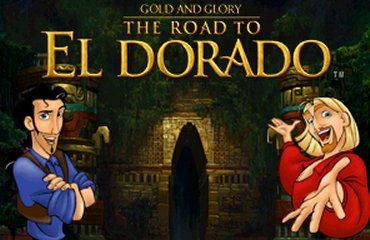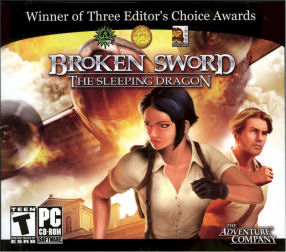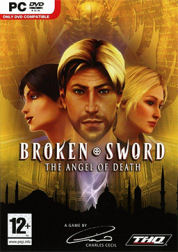|
Charles Cecil |
|
|
|
An interview at Gamescom with the fascinating Charles Cecil, famous for the Broken Sword games and full of great stories about his work as a game creator by Peter Rootham-Smith
GB: How long have you been making games? CC: I wrote my first game for the Sinclair ZX-81 in 1981. So despite my youthful looks, it's for over 30 years!
GB: What kind of games do you like playing yourself? CC: I love, of course, narrative games, particularly when the game tells an interesting story.
I think now more than ever, apart from maybe the nascent days of the early ‘80s, our audience has an incredible choice, whether they want to play ‘Grand Theft Auto’ costing a hundred million dollars to develop, through to ‘Monument Valley’ on the iPad made by a small team in London, Broken Sword on the iPad and PC or whatever. There's a really wonderful range. And testament to that is, of course, Gamescom with hundreds of thousands of people coming to celebrate the art form of video games / interactive narrative.
GB: So you would say games can be Art? CC: Isn’t it semantics? I know that people have long debates about whether video-games can be art. To me it seems so obvious that they are Art. In the same way that at the beginning of the 20th century film was rather looked down on, and the ‘high arts’ were considered so much better. In 20 years time there won't even be a debate because quite obviously what we're doing is extraordinary, and it's a very powerful way of entertaining people. I'm very proud to work in the computer games industry.
GB: One definition of Art is what an Artist calls Art. CC: And then you have the definition of what is an Artist. Semantics, I fear.
GB: What influences your game-making? Books films etc? CC: I'm slightly ashamed to admit that I've never been a very good reader. When I read a book that I really enjoy I get absolutely hooked, but that's probably about one a year - which is quite shocking. I draws a lot of comparisons from film, particularly in the narrative area.
When I was writing the first Broken Sword I got a little bit stuck with the story, particularly with lots of conflicting ideas. I actually attended a two days screen-writing course by Robert McKee, who's quite a well-respected film script theorist. What really excited me was that so many of the ideas he talked about for film are equally relevant to games, for different reasons and in different ways. But the same core principle.
Without doubt the film that profoundly influenced my first games, and many since, is ‘Raiders of the Lost Ark’. My first game for the Sinclair ZX-81 was called ‘Adventure B: Inca Curse’. It started off "You are in a jungle clearing" - that was the extent of the description. In my mind that jungle clearing had huge trees towering above you, dappled light shining through the canopy of leaves, the squawks of parrots, the distant roar of a jaguar. But all I wrote was "You are in a jungle clearing". And years later when I was the head of development at Activision one of the producers came to talk to me, and he was very impressed that I had written ‘Inca Curse’. He told me that he remembered the game so well - how it started off in a jungle clearing, there were huge trees towering above you, the dappled light shining through the canopy of leaves, the squawks of parrots, the distant roar of a jaguar etc. I realised at that moment the power of interactive narrative - and that he had given me much more credit than I was due!
GB: What drives you to make games? CC: With ‘Broken Sword 5’ I'm really thrilled at the opportunity to be able communicate with people both through the games, and directly. And Adventure gamers are a very diverse range of people. Whether it be the readers of sites like GameBoomers, whether it be kids (not that kids don't read GameBoomers) of 11 or 12.
There's a real passion. Adventure is a niche. It's clearly a niche. Not true mainstream in the way ‘Grand Theft Auto’ or the ‘Call of Duty’ are. But it's a very sizeable niche, for the type of person who is happy to take time to explore an environment, who doesn't need instant gratification. That's not to criticise anyone at all. But it is a specific type of person who likes this type of game. And when they do like it they're enormously passionate. We get the most wonderful communications from fans.
Some fans set up "The Order of the Goat”, in recognition of a particularly difficult puzzle that I designed for the first ‘Broken Sword’ game. As we were finishing ‘Broken Sword 5’, I got to hear that there was an Order of the Goat meeting in York one evening. People had come from throughout the UK - some from abroad: someone had even flown in from Sweden to attend! It's extraordinary!
GB: You never wish for a 9 to 5 job then? CC: Oh no. I went to University to read Mechanical Engineering and was sponsored by Ford, and lived in the Ford industrial heartland. It made me realise that I absolutely wouldn't want a 9 to 5 job. Clearly so many people dislike their jobs - what an appalling waste of a life to do something for which you have no passion! But then I can say that from the very privileged position of having got involved in writing games right from the very beginning of the game industry, and having evolved as the industry evolved.
GB: Where you work? Home? Office? CC: When we are not working on a major project, we have a core team of about six people working from home, and we expand into an office when we need to grow for a project so that people can work together. For’Broken Sword 5’ we had a really nice office looking up at York Minster. It was absolutely fabulous. And then as the project comes to an end we then wind back down again. I am currently in a calm period.
I know that the games industry is really vibrant, and some companies are making huge amounts of money. But contrary to popular belief, as a developer it can be very tough. We could not afford at all to run a studio in a traditional way, and employ lots of people full-time. So the way we do it is to expand and contract. I'm delighted that ‘Broken Sword 5’ will go into profit at some point fairly soon, and that is thanks to the fact we could publish it and develop it ourselves in this way.
In developing our previous original games, we were primarily funded by a publisher but also needed to borrow money from banks. We ended up losing money, while the publisher made a huge profit. This change (to self-publishing) has helped us enormously.
GB: How do you manage game development? CC: I am the lead designer and story writer, so manage all aspects of development. Having written games for 30+ years, I can call on a hugely talented pool of freelancers - it’s a great pleasure working with a team of really bright people.
We employed a producer who had been trained in Agile development (I need to go on an Agile course because I'm from the old school which is called "Waterfall”). Waterfall was the system that publishers used to require us to use - in which we define all aspects of the project, throughout development, in advance. But it's absolute nonsense for a creative project because you're then constrained within a straitjacket.
GB: Who do you make games for? CC: I rather perversely mould games around subject matters that I'm passionate about. My feeling on this is that if I'm excited then hopefully I can make the audience excited too. But I also write games from a pragmatic perspective - I'm writing them for an audience rather than for myself. So it's a kind of combination of both.
GB: Are you working on something new now? CC: No, and I can honestly say I don't know what I'm going to write next. We have fifteen thousand Kickstarter backers, and it was wonderful to communicate with them digitally. Of these 3,500 pledged physical rewards. Of course come the end of the project we now have digital and physical rewards that need to be produced and sent out - we recently sent out the box and T-shirt. I’ve spent quite bit of time creating those rewards, and organising how they're going to be sent out.
I have a number of ideas, but I really don't know what we're going to do next. Whether it be a ‘Broken Sword’, or ‘Beneath a Steel Sky’, or a totally original game. Or maybe even work with a license. I've actually got four ideas on the boil. The way I tend to work is to push all the ideas to a certain point, and then I'll present it to the team. In presenting it you kind of instinctively know which are the best ones, and just go with them. It’s a bad idea to just to go with one idea, get wedded to it, and when it doesn't work you have nothing to fall back on so you keep on going forward and eventually end up in a cul-de-sac.
GB: So the support from the fans has been very important? CC: It's been important for several reasons. Obviously the money from the pledges was vital because we were financially in a weak position - without this funding, the game would not have been made. But also the feedback that we got was hugely valuable, and also the morale that we got from experiencing the passion around us. When a team reaches the end of a big project inevitably they start to lose enthusiasm, but the team has to maintain the passion. The response from our fans, who clearly liked to be involved in the development from an emotional perspective, was very flattering, and gave us a great morale boost.
GB: People have invested a lot in the stories of George and Nico. CC: They have - both emotionally and financially. I'm very very aware of that. On the production of ‘Broken Sword 5’ through Kickstarter, people have pledged up to £5,000. One of the top backers has to this day not registered. I asked our wonderful community manager Triona to contact him, and he came straight back to say that he works in film now - he was inspired by Broken Sword when he was young, and just wanted to help. He has a small apartment and please don’t send him anything. Isn't that fantastic?
Let me tell you another story as well, which really enthused me. A fellow wrote in to say at the beginning of the project that he really wanted to support ‘Broken Sword 5’ because ‘Broken Sword 1’ had meant so much to him. When he was young, he had a very close relationship with his grandmother. She took him to a games shop and said that she would buy him a game, any game as long as she approved. And he chose Broken Sword. He described how he used to run back from school to his grandmother and then they’d play the game together. And whenever he was stuck they would talk about what he had done so far. And he wrote to thank us because this videogame encapsulated the really close relationship he had had with his grandmother. Which is incredibly moving. I think he started it with "Probably nobody will read this but…”. Ten years ago no-one would have read it. It would have gone into a box somewhere because it didn't need a response.
GB: That's a wonderful story. CC: Let me tell you another one. Someone - again probably in their thirties, wrote that he really worshipped his older brother, they were inseparable. They used to quote ‘Broken Sword’ lines to reach other, play the game again and again. And then his brother went to swim in a quarry and tragically drowned. And again this young man was talking about ‘Broken Sword’ as being a really important part of the relationship with his brother that he so loved. These are extraordinary stories, that wouldn't be possible in any other medium. Of course you met your girlfriend, or your boyfriend, watching a particular film, you had a little kiss and it was very important. But the intensity of the relationship of actually interacting together is unique to narrative videogames. I think we should be very proud of that.
GB: Is now a good or bad time to be making games? CC: I would say the very early ‘80s was a fantastic time, then games went directly to gamers from publisher / developers like Artic Computing (the first company I was involved with in the early ‘80s). After that retailers became powerful, and then publishers as the costs increased and video games need third party funding. I didn't actually get paid for the first game I wrote in 1981, but if I had, it would have been a couple of hundred pounds. In 1990 our first game was ‘Lure of the Temptress’ which cost twenty thousand pounds. That felt like such a lot of money! So the cost had gone up by a factor of a hundred. By the time we wrote ‘Broken Sword’ it was a million pounds, actually more than a million pounds. So it had gone up by another factor of a hundred. The whole market has changed profoundly because back in those days you could write a game for a couple of hundred pounds, whereas in the retail era it costs millions.
The wonderful thing about now, because there is no longer the slots you have to compete for in retail shops, is you can again write a game for a couple of thousand pounds, or perhaps tens of thousands, and release it. So if you, as a programmer or an artist, get together with someone in a complementary team, say students in a university, you could write and publish a game. ‘Papers please’ which I've been playing recently is wonderfully simple, great game. The design is absolutely stunning but the execution is very simple, and it's hugely successful. Likewise Mike Bithell’s ‘Thomas Was Alone’, incredibly simple game-playing mechanic.
So I think there's never been a better time to either write games, or as a gamer to play them.
GB: Can games say things? CC: Absolutely they can. The book is a medium that is particularly good at conveying inner-personal conflict because you can go right into the head of the protagonist. Film allows inner-personal conflict through great acting. But film is also about the spectacle. Games, because we don’t tend to film actors directly, are more like cartoons. Walt Disney famously promised to create a cartoon that would make his audience cry: games still strive to do this. Games are very good at creating visceral emotion, and we're learning how to do more.
But it’s not trivial. Steven Spielberg planned to create his opus magnum with Electronic Arts, and if you remember originally he wrote the block game ‘Boom Blox’, and eventually his big one was cancelled. It's really difficult for these people because any designer really needs to understand the constraints and opportunities in the interactive medium. Whether it's Peter Jackson with ‘Halo’, or Steven Spielberg with his great work, all these great film people find it hard to succeed in the interactive medium because the medium has its own unique rules which are quite different to those of a linear medium.
Now on ‘Beneath a Steel Sky’ I had the absolute privilege to work with Dave Gibbons, the comic book artist behind ‘Watchmen’, and then Barrington Pheloung (‘Inspector Morse’) who was a cricketing friend of mine who composed the music. But these were all people who absolutely understood that the gameplay drove everything, and as the director I was the one who ultimately managed that aspect.
GB: Will you still be making games in ten years time? CC: Oh yes - unless they kick me out, or I die.
GB: What are the important features of a game? CC: Ultimately all that matters is whether the gameplay is fun: whether it challenges you in an interesting way, whether it offers decisions with interesting outcomes. The story and graphics must ultimately support great gameplay. The gameplay in an Adventure creates the challenges which then offer the rewards of narrative progression.
GB: Does the story come first or the gameplay? CC: The story comes first in the way we design the game, but in terms of the way it is played it has to be the gameplay. If the puzzles are dull the story can be the best in the world but no-one will ever get far enough into the game to experience it.
GB: The players can experience a game at different rates CC: Yes - which is why we included a hint system to help people play at the rate that they want - hardcore adventure fans proudly using no hints, more casual gamers making liberal use of the hints to progress faster. Generally the hint system is very popular, although a few purists say that it offers too much temptation to ‘cheat’.
A recent phenomenon is speed running through adventure games. Which kind of defeats the point of an adventure - except that presumably those playing are very familiar with the game, so are doing the speed run because they love the game.
|








